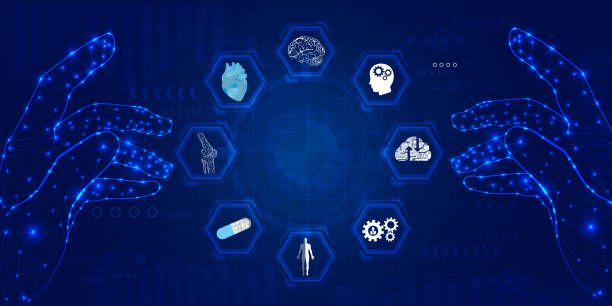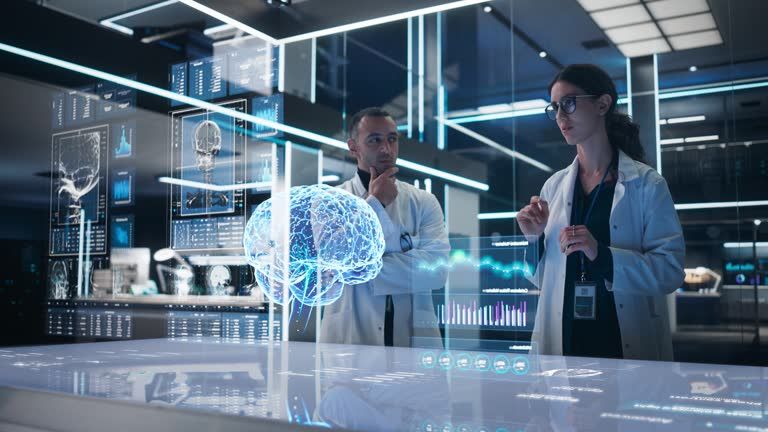and the distribution of digital products.
DM Television
Is Artificial Intelligence in Healthcare a Ticking Time Bomb or Timely Solution?
Artificial intelligence, the ability of computer systems or digitally controlled robots to perform human-like activities is the biggest new innovation in the world of technology. Over the years, digital computers have been programmed to carry out complex tasks like discovering proof for mathematical theorems or playing chess with master proficiency. Technology makes life easier for us all and as artificial intelligence has successfully been applied to several fields, it makes sense that we apply the innovation that artificial intelligence brings to healthcare.
\ Artificial intelligence in healthcare has the potential to transform different sectors such as administration, patient care, and pharmaceuticals. According to a study conducted in 2019, there are a significant number of studies suggesting that artificial intelligence can be better at performing human tasks like making diagnoses of health conditions. Algorithms are already helping identify malignancies in patients and guiding researchers during clinical trials. Artificial intelligence has been used in medicine to predict which treatment protocols will produce better outcomes for a specific patient, providing guidelines for patient-centered care.

\ Artificial intelligence in healthcare comes with the challenges of bias and fairness in patient care across different regions all over the world. This is the reason why equity and justice must be considered as key factors in the implementation of artificial intelligence in healthcare. The relationship between equity, justice, and artificial intelligence is not easily understood. Ethics in the application of artificial intelligence in healthcare means ensuring patient safety, fairness, and confidentiality. In pursuing equity and justice, it is important to respect patient’s autonomy and their rights to make informed decisions about their health. Unlike clinical topics which may have a clear explanation, artificial intelligence is somewhat of a complex topic, especially for healthcare providers who may need to inform patients of different procedures and possible complications. In providing equity and fairness, artificial intelligence must be subjected to rigorous studies for full transparency.
\ Justice has a close bond with artificial intelligence in healthcare. Social work initiatives such as one-one-on-one clinical work and macro-level research allow researchers to implement models and adjust them based on real-time feedback. In addition, the clinical methodologies overlying research in artificial intelligence can provide data on the patterns, systems, and problems that affect healthcare. The data can provide insights and recommendations on better solutions in clinical practice, outreaches, advocacy, and policy-making.
\n

\ Artificial intelligence in healthcare provides several benefits for patients, healthcare providers and the healthcare sector for different economies. One way in which artificial intelligence makes healthcare better is the ease of administrative workflow. Healthcare staff spend a lot of time and hospital resources documenting on pen and paper. Artificial intelligence and automation can help perform these tasks, freeing up time for other clinical tasks. For example, generative artificial intelligence can help clinicians with note-taking and content summarization that can help keep medical records as thoroughly as possible. Artificial intelligence can also help in the coding and sharing of information between hospital departments, as well as billing.
\ A study showed that 64% of patients were comfortable with the use of artificial intelligence to access information that support nurses provide. Artificial intelligence virtual nurse assistants are chatbots, apps, or other interfaces that can help patients carry out tasks. These tasks include asking about medications, forwarding reports to doctors, and helping schedule physician visits. These virtual assistants help focus more attention on actual patient care.
\ A Nature Medicine study shows that 70% of patients do not take their insulin as prescribed. Artificial intelligence can be used to identify errors in administration of medication such as insulin or inhalers. An artificial intelligence-powered tool sits in the patient’s background and can be used to point out errors in patient self-medication. Another application of artificial intelligence in healthcare is the use of robots for less invasive surgeries. These robots may be used to work around sensitive organs and tissues, reducing hemorrhage, infection, and post-surgical pain. The healthcare industry is said to be at high risk of fraud: covering over $380 billion per year and contributing to patient costs. Utilizing artificial intelligence can help detect fraudulent activities such as overbilling and health insurance fraud. A challenge that patients face in healthcare is communication with doctors and healthcare staff. Artificial intelligence technologies like natural language processing(NLP), predictive analysis, and speech recognition can deliver more specific information about a patient's treatment options, creating room for better communication in healthcare.

\ According to Harvard's School of Public Health, using artificial intelligence to make diagnoses may reduce health costs by up to 50% and improve healthcare by up to 40%. At the University of Hawaii, a research team discovered that deep-learning artificial intelligence could improve breast cancer risk prediction. In addition, US, German, and French researchers used deep learning on more than 100,000 images to identify skin cancer. Comparing the results of artificial intelligence to those of 58 international dermatologists, they found out that artificial intelligence provides better results. The ease of diagnosis reduces the burden on healthcare providers, reduces the cost of missed diagnosis, and reduces patient complications.

\ Genetic medicine can save a lot of lives: incorporating artificial intelligence into the world of genetic medicine will work wonders in healthcare. When applied to large populations, artificial intelligence can help monitor for emergency disease threats like COVID-19. In addition, genomic data can be analyzed to provide insights into genetic markers associated with increased susceptibility to certain diseases. These findings can be utilized for early prevention and detection of specific health conditions, reducing the burden on healthcare. An interesting concept in the world of healthcare is personalized medicine. Personalized medical care tailors management approaches to individual patients based on their unique characteristics such as genetics, environment, lifestyle, and biomarkers. The personalized approach provides healthcare interventions that are more effective, efficient, and safe for the patients. Artificial intelligence can potentially help analyze complex healthcare data sets, Predict patient outcomes, and optimize treatment strategies. Artificial intelligence has provided wearable sensors that can collect, analyze, and transmit real-time health data to healthcare providers so that they can make efficient decisions based on this data. These wearable sensors can help track significant health data such as blood pressure, pulse, heart rate, oxygen saturation, temperature, physical activity, and sleep patterns.

\ The data collected by these sensors can be analyzed by machine learning algorithms to provide insights into an individual’s health status, enabling early detection of health challenges and the provision of personalized healthcare. The benefits of artificial intelligence are uncountable and bound to address the healthcare disparities that affect patients worldwide. The regular traditional approaches that aim to make healthcare accessible to all, have not shown results.
\ Artificial intelligence helps analyze large datasets for patterns, correlations and predictive patterns that are difficult to identify through traditional analyses. Artificial intelligence can help identify hidden mechanisms and causes of healthcare disparities. AI has many advantages compared with traditional strategies for addressing health disparities, notably in its ability to uncover unexpected correlations and relationships that have remained unidentified in human-driven analyses, offering new insights. Populations that have been historically marginalized and experienced barriers to healthcare will now be fully represented, with full access to healthcare. To fully address these health disparities, it is important to ensure equity in all stages of artificial intelligence use and processes in healthcare. The best way to implement that is to provide more diversity within the teams developing and deploying artificial intelligence algorithms. Greater representation from various stakeholders from diverse backgrounds, including policymakers, researchers, clinicians, and ethicists, must be included to ensure different voices and perspectives are included in the research team. This is because diverse research teams are more able to identify potential disparities, inequities, or underrepresentation that could lead to bias.

\ Despite the benefits that artificial intelligence offers to the field of healthcare, there are some challenges. A significant challenge is that of bias: various biases are employed while deploying artificial intelligence algorithms and these biases can affect fairness by skewing results. Certain factors should not influence the quality of patient care and they include age, race, gender, disability, sexual orientation, and political affiliation, among others. In traditional healthcare, these factors may result in biases because of the complexities of human interactions and decision-making processes. However, in the world of artificial intelligence, biases often result from two main factors. The factors are the data used for algorithm training (data bias) and the inherent design or learning mechanisms of the algorithm itself (algorithmic bias). Bias may also occur when there number of members in a dataset is not sufficient enough to get statistical patterns.
Bias affects predictive artificial intelligence tools: a study showed the application of a predictive tool to analyze videos of robotic surgeries conducted at hospitals. The tool was used to assess the skill level of surgeons completing multiple different surgical activities, including needle handling and needle driving. The tool was downgrading surgical performance erroneously, predicting a particular skill to be lower quality than it was in some surgical cohorts. On some other occasions, the tool upgraded surgical performance erroneously, predicting a specific skill to be of higher quality than it was.
\ Another example is an AI algorithm used for predicting future risk of breast cancer which suffers from a performance gap where black patients are more likely to be assigned as “low risk” incorrectly. In addition, an algorithm trained on hospital data in Ghana might not perform well in the United States, as the patient population, treatment plans and medications may differ. A pressing challenge that artificial intelligence brings to healthcare is data safety. Concerns are being raised on data safety because private entities control most artificial intelligence technologies. This means that healthcare providers, hospitals and public bodies have more control of patient healthcare data. There is also the risk of data breaches through artificial intelligence methods. The ability to anonymize patient health data may be compromised or even nullified in light of new algorithms that have successfully reidentified such data. This could increase the risk to patient data under private custodianship.
\

\ Liability is another problem for the use of artificial intelligence in healthcare. “If a doctor misdiagnoses a patient or gives a wrong treatment, the doctor can be sued. If artificial intelligence algorithms make costly mistakes that result in complications for a patient, who is to be sued?” The problem is that artificial intelligence is not a human being and cannot be directly responsible for acts of negligence. There is a significant obstacle preventing the widespread adoption of artificial intelligence in healthcare: implementation. There is a knowledge gap in the utilisation of artificial intelligence tools in healthcare as many healthcare workers do not fully understand the concept of artificial intelligence. In addition, novel technologies such as artificial intelligence are sometimes resisted by healthcare leaders, delaying their implementation. This is because these healthcare leaders do not see how artificial intelligence fits into existing healthcare work practices and processes.
\ A study conducted among doctors revealed resistance to the use of artificial intelligence in healthcare. Some healthcare providers view artificial intelligence as expensive so implementation becomes a challenge because of the perceived cost. There is also the additional cost of training healthcare workers on the use of artificial intelligence tools. Another reason why artificial intelligence costs so much is the infrastructure, equipment, and technical requirements required to set up its tools in a healthcare system. Healthcare leaders may not want to adopt artificial intelligence in healthcare because of the fear of technology dependency. Some healthcare workers and leaders believe that regular use of artificial intelligence tools will make healthcare workers unable to improve their clinical skills and lose their communication skills that improve patient relationships. They also fear that with artificial intelligence taking over healthcare, their jobs will be taken over. The fear is that artificial intelligence tools will replace healthcare staff. All these challenges make artificial intelligence in healthcare inaccessible in some regions of the world, especially in low and middle-income countries where finance is a major determining factor in accessing quality healthcare.

\ For every problem, there is a solution. If we want to utilize artificial intelligence for our own benefit in our hospitals, we must ensure equitable access to artificial intelligence in healthcare. One way to ensure that is by providing funding and support: a good example is when the White House announced a $140 million investment for the National Science Foundation to assess generative artificial intelligence (GenAI) systems. The Food and Drug Administration (FDA) has also taken steps by releasing a beta version of its regulatory framework for medical device AI used in healthcare. If funding is provided, the cost of artificial intelligence systems will be reduced and these tools will be more accessible to healthcare staff all over the globe.

\ Regulatory policies are the solution for the data concerns and legal issues associated with artificial intelligence in healthcare. Policies can help to address the challenges of bias, promote diversity, increase transparency, and enforce accountability in artificial intelligence systems. Regulatory policies can help utilize the potential of artificial intelligence to improve healthcare delivery and reduce costs while ensuring fairness and inclusion. These policies should mandate the regular auditing of artificial intelligence systems in healthcare to eliminate bias and functionality errors. Policies should also include guidelines on the use of artificial intelligence in healthcare and allocate funding for the healthcare benefits of the marginalized. There are several examples of how artificial intelligence innovations aim to promote health equity, but this example from UNICEF caught my eye. In June of 2024, UNICEF announced its commitment to support public health initiatives by leveraging digital health and artificial intelligence among vulnerable populations like children. The goal was to reach zero-dose children (children who had never been vaccinated) and explore different strategies to ensure that the children were vaccinated. UNICEF planned to reach these children by leveraging machine learning and data analytics. The tool used combined satellite imagery, census projections, national household surveys, and geospatial data to identify settlements and map population distribution in detail. The goal was to map under-vaccinated and zero-dose children down to their villages. The methods employed also helped to map demographics and socioeconomic indicators, providing additional insights on equitable access to services, vulnerability, and gender barriers. UNICEF was aware of the data risks and they mapped out an approach. The approach was twofold: safeguarding children’s data and ensuring the equitable use of artificial intelligence technologies. UNICEF created data guidelines and policies for the children, ensuring that artificial intelligence technologies were used responsibly and equitably in their health programs.
\

\ I believe that artificial intelligence will provide many amazing solutions in the world of healthcare. The possibilities are endless from seamless diagnosis to virtual healthcare assistants to disease prevention and monitoring of health conditions. However, some challenges make the adoption of artificial intelligence in healthcare a difficult task. If governments of different countries, healthcare providers and organizations come together collectively to apply solutions that provide access to artificial intelligence in healthcare for everyone, the burden on healthcare workers will be reduced and patient health will improve. There will be an overall reduction in patient morbidity and mortality, indirectly improving work productivity and increasing the Gross Domestic Product. If these solutions are not applied, people from low and middle-income countries, minority groups, and the financially challenged may not get access to the several benefits that artificial intelligence tools provide in healthcare. Equity would be just a fancy word we say, just to make everything better when healthcare is becoming more difficult to access. My question is, “ What is it going to be?” “Is Artificial Intelligence in Healthcare A Ticking Time Bomb or A Timely Solution?” The answer is: it depends on us. Only time will tell.
\n
- Home
- About Us
- Write For Us / Submit Content
- Advertising And Affiliates
- Feeds And Syndication
- Contact Us
- Login
- Privacy
All Rights Reserved. Copyright , Central Coast Communications, Inc.